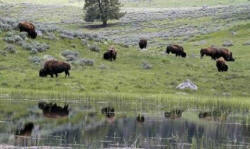|
 Conservation
groups ask Obama administration to protect Yellowstone bison Conservation
groups ask Obama administration to protect Yellowstone bison
 Send a link to a friend
Send a link to a friend
[November 14, 2014]
By Laura Zuckerman
(Reuters) - Two conservation groups asked
the Obama administration on Thursday to provide Endangered Species Act
protections for about 4,900 bison at Yellowstone National Park, where
managers intend to cull the herd by 900 this winter.
|
|
 Buffalo Field Campaign and Western Watersheds Project said in a
petition to the U.S. Fish and Wildlife Service that buffalo at the
park that spans parts of Wyoming, Montana and Idaho made up part of
the only free-roaming band in the country to retain its genetic
integrity. Buffalo Field Campaign and Western Watersheds Project said in a
petition to the U.S. Fish and Wildlife Service that buffalo at the
park that spans parts of Wyoming, Montana and Idaho made up part of
the only free-roaming band in the country to retain its genetic
integrity.
That compares to herds of bison elsewhere in the United States that
contain domestic cattle genes and the 139 bison that originated at
Yellowstone that on were placed on Thursday 13,000 acres owned by an
Indian tribe in northeastern Montana.
"The wild bison living in and around Yellowstone are the only bison
in America to continuously occupy their native habitat since the
days when tens of millions migrated freely across the continent. A
listing under the Endangered Species Act is necessary to ensure the
survival of this iconic species,” said Dan Brister of Buffalo Field
Campaign.
 Federal and state agencies that manage the park’s buffalo said
earlier this year that some 900 head must be killed through hunting
or slaughter this winter.
The push to cull bison that seasonally migrate from the high
elevations and deep snows of Yellowstone in a search for food at
lower elevations in Montana will bring the population closer to a
target of 3,000 to 3,500 buffalo, government managers said.
The huge, hump-backed animals are a top attraction for the 3 million
annual visitors to Yellowstone, but those that wander from the park
raise fears among ranchers they will spread the bacterial disease
brucellosis to cattle.
[to top of second column] |

About half of Yellowstone’s bison have been exposed to the disease,
likely brought to the park by cattle that once grazed there. The
ailment can cause cows to miscarry and jeopardize Montana’s
brucellosis-free status allowing shipment of livestock across state
lines without expensive testing.
The Fish and Wildlife Service did not immediately respond to a
request for comment on Thursday.
The 139 bison originally from Yellowstone that arrived on Thursday
at the Fort Peck Indian Reservation had been part of a successful
government experiment that quarantined them to produce a band free
of brucellosis.
(Reporting by Laura Zuckerman in Salmon, Idaho; Editing by Dan
Whitcomb and Peter Cooney)
[© 2014 Thomson Reuters. All rights
reserved.] Copyright 2014 Reuters. All rights reserved. This material may not be published,
broadcast, rewritten or redistributed.

 |